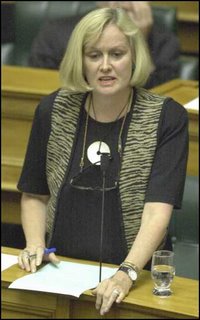
Remember Matt Robson? Supporter of Cuba, Jim Anderton's former colleague who lost his seat in Parliament as part of the decline of Jim Anderton's Progressive Party. Well
he's in Scoop claiming foreign owned media set the public agenda in New Zealand. What bollocks.
.
He goes back to the late 1980s claiming "At the time, Labour was under pressure from a resurgent National promising big tax cuts and a big spend-up to boot. The foreign-owned media, as always, gave National a free ride by providing no analysis into how National could possibly deliver both tax cuts for the rich and a big spend-up on everything from transport to defence, police to National Super."
.
Hold on Matt - the economy was stagnant, unemployment was high, and GST had been increased to cover Labour's second term big social spending to avoid the deficit going out of control. That had something to do with Labour losing. The foreign owned media did NOT include television, which was TVNZ and TV3, TV3 being 85% NZ owned at this point and with a tiny audience - the government owned TVNZ, and Radio NZ which was the dominant radio broadcaster, owning two national commercial radio networks, plus National Radio. So apparently, foreign owned newspapers sway the electorate more than electronic media hmmmm.
.
Funnily enough the didn't give analysis into how MMP wouldn't deliver the answers people want and didn't report on how MMP was a largely leftwing project driven by people aligned to the Alliance - although it would have been in the "foreign media''s" interests to do so by your theory.
.
He's saying that now "And just like then, we have foreign-owned media outlets day after day proclaiming in feature articles, editorials and front-page new stories that the "surplus" should be used for large tax cuts that would mainly benefit those on higher incomes without children." While state TV and radio do the opposite - get over it Matt, you might actually find around 40% of New Zealanders voted for tax cuts - because they WANT them. Unlike in Cuba where people can't vote.
.
Let's get it clear - the leftwing corporate media conspiracy is nonsense because:
.
- The most influential media of all - television- is dominated by state owned broadcaster TVNZ, followed by Canwest owned TV3/C4 (TV3 news is rarely less leftwing than TVNZ) and then Sky (which has virtually no local news programmes);
- Radio NZ is state owned, and has about 20% of the radio market, another 5% comes from Maori broadcasters and the rest on commercial music and talkback stations. These are owned by a mixture of foreign and local shareholders, and are driven by seeking audiences - rather hard to push an agenda the audience doesn't want to hear;
- Newspaper editors are driven by two things - circulation and advertising. Circulation requires newspapers to sell stories people want to read, and advertising flows on from getting an audience. Papers that don't reflect what people want don't succeed, and several newspapers have failed and started in history as a result;
- Anyone is free to establish a TV station, radio station, newspaper or website to counter views they don't like. It is called freedom, it allows competitiveness of ideas and libertarians find it a lot harder to get media attention than hardened leftists;
- Magazines and the internet are important alternative media outlets, and there is an enormous range of choice with both.
.
If the corporate media conspiracy existed, then ACT would have done very very well indeed - ACT would always have got good press, and the Don Brash Brethren connection would have been swept under the carpet. People on both sides of the political spectrum think the media is biased against them - I think the media is largely statist - because rarely do editors or reporters advocate a position of the government NOT intervening in something. Also, why does it have to be foreign? What's wrong with foreigners? Why is the left so damned xenophobic?


